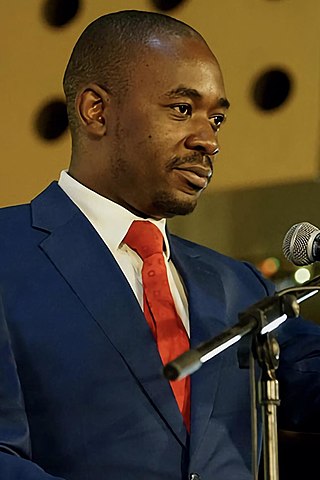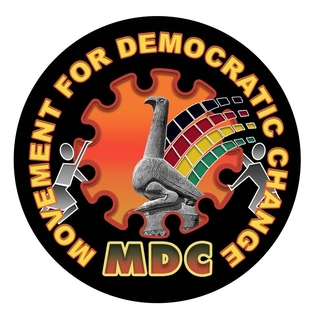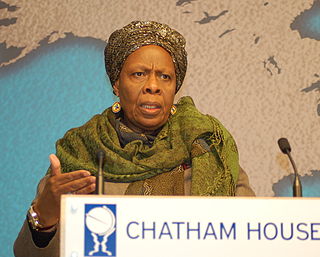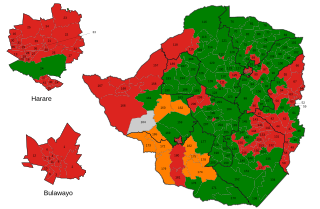Until roughly 2,000 years ago, what would become Zimbabwe was populated by ancestors of the San people. Bantu inhabitants of the region arrived and developed ceramic production in the area. A series of trading empires emerged, including the Kingdom of Mapungubwe and Kingdom of Zimbabwe. In the 1880s, the British South Africa Company began its activities in the region, leading to the colonial era in Southern Rhodesia.

Arthur Guseni Oliver Mutambara is a Zimbabwean politician. He became the president of the Movement for Democratic Change (MDC) in February 2006. He has worked as a director and CEO of Africa Technology and Business Institute since September 2003. Under a September 2008 power-sharing agreement, Mutambara served in the government as one of two Deputy Prime Ministers from 2009 to 2013.
The following lists events that happened during 2000 in Zimbabwe.
The following lists events that happened during 2007 in Zimbabwe.

There were widespread reports of systematic and escalating violations of human rights in Zimbabwe under the regime of Robert Mugabe and his party, ZANU-PF, between 1980 and 2017.

Tendai Laxton Biti is a Zimbabwean politician who served as Finance Minister of Zimbabwe from 2009 to 2013. He is the current Member of Parliament for Harare East Constituency and the second Vice President of Citizens Coalition for Change. He was the Secretary-General of the Movement for Democratic Change and the subsequent Movement for Democratic Change – Tsvangirai (MDC-T) political parties and a Member of Parliament for Harare East until he was expelled from the party and recalled from parliament in mid-2014,before winning the seat again in 2018.

Nelson Chamisa is a Zimbabwean politician and the current President of the Citizens Coalition For Change. He served as Member of the House of Assembly of Zimbabwe for Kuwadzana East, Harare. Chamisa was the MDC Alliance's candidate for president in the 2018 general election, having previously been the leader of the party's youth assembly. He has served as the former chairperson of national youth for the same party as well as the Secretary for Information and Publicity for the opposition party Movement for Democratic Change (MDC). In 2003, at the age of 25, Chamisa became the youngest Member of Parliament. Chamisa was also the youngest cabinet minister in Government of National Unity of Zimbabwe in 2009.
Zimbabwe began experiencing a period of considerable political and economic upheaval in 1999. Opposition to President Mugabe and the ZANU-PF government grew considerably after the mid-1990s in part due to worsening economic and human rights conditions. The Movement for Democratic Change (MDC) was established in September 1999 as an opposition party founded by trade unionist Morgan Tsvangirai.

United States–Zimbabwe relations are bilateral relations between Zimbabwe and the United States. Both countries share a common history and language as former British colonies.
This article gives details about the vote counting system for the 2008 Zimbabwe presidential election
The second round of voting in the Zimbabwean presidential election of 2008 was held between Robert Mugabe and Morgan Tsvangirai after the first round failed to produce a 50% majority for either candidate. The election process was marred by violence against and intimidation of voters and party workers, which eventually led to the withdrawal of Tsvangirai from the poll. This left Mugabe as the winner of, effectively, a one-candidate election.

The 2008–2009 Zimbabwean political negotiations between the opposition Movement for Democratic Change, its small splinter group, the Movement for Democratic Change – Mutambara, and the ruling Zimbabwe African National Union – Patriotic Front were intended to negotiate an end to the partisan violence and human rights violations in Zimbabwe and create a framework for a power-sharing executive government between the two parties. These negotiations followed the 2008 presidential election, in which Mugabe was controversially re-elected, as well as the 2008 parliamentary election, in which the MDC won a majority in the House of Assembly.

The Movement for Democratic Change – Tsvangirai (MDC–T) is a centre-left political party and was the main opposition party in the House of Assembly of Zimbabwe ahead of the 2018 elections. After the split of the original Movement for Democratic Change in 2005, the MDC–T remained the major opposition faction, while a smaller faction, the Movement for Democratic Change – Ncube, or MDC–N, was led by Welshman Ncube.

Morgan Richard Tsvangirai was a Zimbabwean politician who was Prime Minister of Zimbabwe from 2009 to 2013. He was president of the Movement for Democratic Change, and later the Movement for Democratic Change – Tsvangirai (MDC–T), and a key figure in the opposition to former president Robert Mugabe.

Sekai Holland is a Zimbabwean former politician who served as Minister of State for National Healing, Reconciliation and Integration in the administrations of President Robert Mugabe and Prime Minister Morgan Tsvangirai. Sekai has been involved in campaigning on a number of human rights issues, including those relating to Aboriginal Australians, apartheid in South Africa and the women's rights and democracy in Zimbabwe.

Presidential elections were held in Zimbabwe between 9 and 11 March 2002. The elections were contested by the incumbent president Robert Mugabe, Movement for Democratic Change leader Morgan Tsvangirai, ZANU–Ndonga leader Wilson Kumbula, Shakespeare Maya of the National Alliance for Good Governance and independent candidate Paul Siwela. Although Mugabe won with 56.2% of the vote, it was the closest presidential election to date.

General elections were held in Zimbabwe on 29 March 2008 to elect the President and Parliament. Because of Zimbabwe's dire economic situation, the elections were expected to provide incumbent President Robert Mugabe with his toughest electoral challenge to date. Mugabe's opponents were critical of the handling of the electoral process, and the government was accused of planning to rig the election. Human Rights Watch said that the election was likely to be "deeply flawed."

General elections were held in Zimbabwe on 30 July 2018 to elect the President and members of both houses of Parliament. Held eight months after the 2017 coup d'état, the election was the first since independence in which former President Robert Mugabe was not a candidate.

In November 2017, Zimbabwean president Robert Mugabe was removed as president and party leader of ZANU–PF and was replaced by Emmerson Mnangagwa.

Evan Mawarire is a Zimbabwean pastor and democratic activist. He came to prominence during the 2016–17 Zimbabwe protests that challenged the rule of Robert Mugabe’s government. It was reported that Mawarire urged the people of Zimbabwe to remain defiant and refuse to return to work after the protests. In late 2017, it was reported by BBC News that Mawarire was acquitted by a Zimbabwe court where he faced a potential 20-year prison sentence if convicted for allegedly trying to overthrow Robert Mugabe. Thousands turned up at his hearing sparking a spontaneous social movement that challenged corruption, injustice and poverty On 13 July 2017 at least 150 lawyers stood up in court to represent Mawarire, while thousands amassed outside a Harare courthouse.













